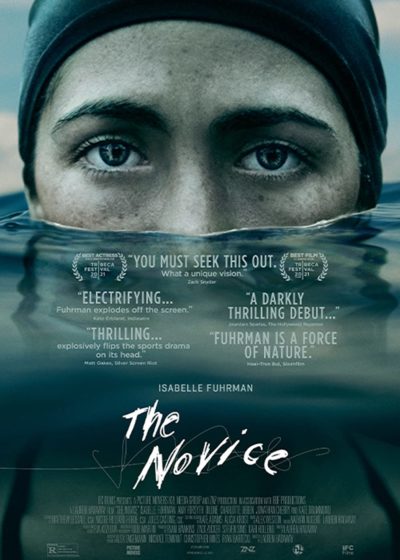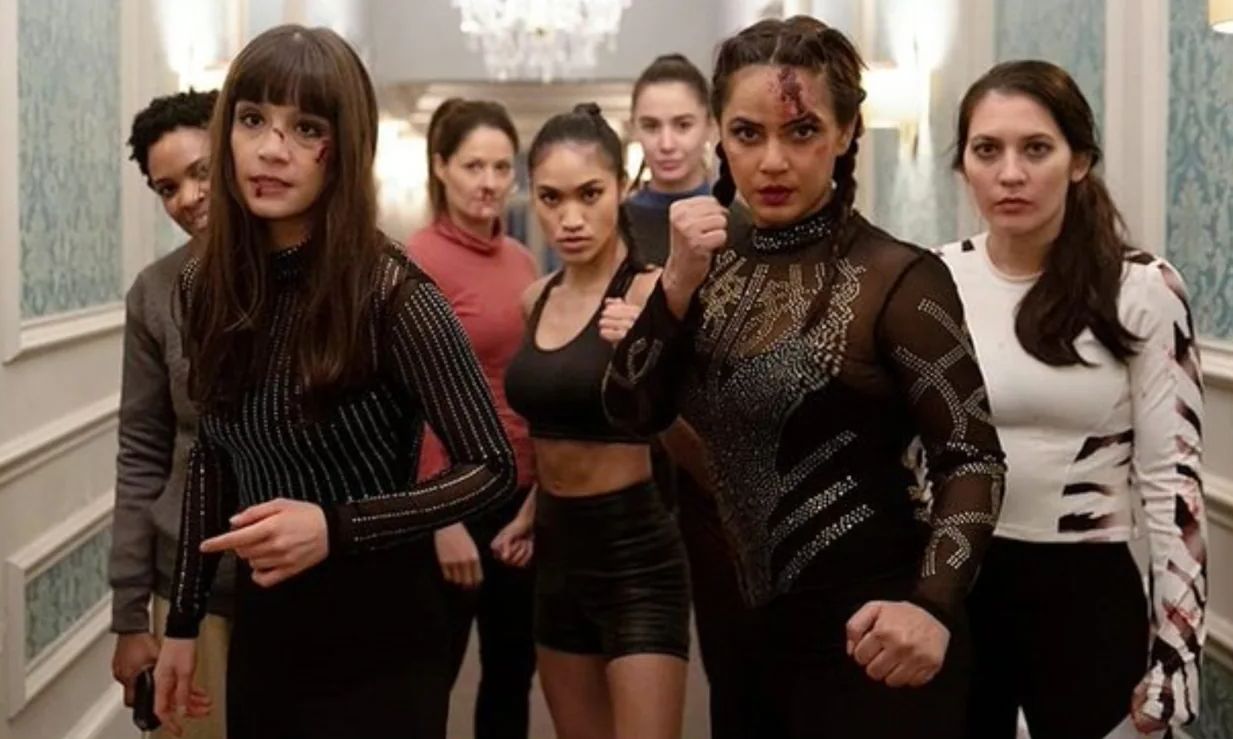½
“I know ninjas are supposed to be silent, but…”
 To a certain degree, this should be graded as “incomplete”. Easiest to quote the IMDb on the reason why. “This film was to be shelved by director Kabasinski, when post-production had a lengthy delay and he went on to produce the film Skull Forest. Very happy with the improvements in overall production value of Skull Forest, Kabasinski was going to just take this film as a ‘loss’ having already moved forward. It was not until an editor from Buffalo, NY stepped in and expressed desire in taking on the project. Feeling indebted to the cast and crew for the film and post-production going better then expected, Kabasinski decided on releasing the film.”
To a certain degree, this should be graded as “incomplete”. Easiest to quote the IMDb on the reason why. “This film was to be shelved by director Kabasinski, when post-production had a lengthy delay and he went on to produce the film Skull Forest. Very happy with the improvements in overall production value of Skull Forest, Kabasinski was going to just take this film as a ‘loss’ having already moved forward. It was not until an editor from Buffalo, NY stepped in and expressed desire in taking on the project. Feeling indebted to the cast and crew for the film and post-production going better then expected, Kabasinski decided on releasing the film.”
He shouldn’t have bothered. Because it does the Kabasinski brand-name irreparable damage, due to its terrible quality, in one aspect especially. If this had been fixed, it still wouldn’t have been great – it would remain cheap and amateur. But it would not be in the conversation for worst action heroine movie of all-time, as is the case based on what was eventually released. The story is about an assassin, known only as “The Lost One” (Porada), who is part of a sect of ninjas. On a mission, she balks when she is ordered to kidnap a child. This mutiny is not taken well, and she is left for dead by her colleagues. Naturally, she isn’t, and teams up with some Mafia hitmen (Anthony and Poffo) to get her revenge.
It’s a basic plot, yet not unworkable, especially when delivered with the director’s enthusiastic fondness for gratuitous nudity and gloopy violence. The low budget doesn’t really matter when you are talking nekkid ninja training. But what irredeemably sinks the movie, and why it should have remained lost (or, at best, a bonus feature on another movie) is the audio. Regular readers will know this is a common complaint I have with smaller productions, and it’s a personal peeve. I don’t use words like “worst ever” lightly either. So you will understand how much of an issue it is that – bold font, please – this is the worst ever audio I have heard on a released film, bar none.
Seriously, the audio is entirely missing for about half the scenes. No music, no background sounds, nothing. This includes the entire opening credits, which feature Mrs. Kabasinski doing more nude sword work. It almost becomes some bizarre form of art statement, like a throwback to the silent era. Even when it’s present, it is poorly mixed and the dialogue sometimes inaudible. It would probably have worked significantly better had Kabasinski nuked all the audio, turned it b&w, added some intertitles to tell us the plot, and thrown ninety minutes of public domain orchestral music onto it. Instead, what you have is a feature-length demonstration about the importance of the auditory portion to cinema. As well as how worthless a movie can be, when the makers simply cannot be bothered to deliver the materials.
Dir: Len Kabasinski
Star: Renee Porada, Brian Anthony, Lanny Poffo, Darian Caine





 This rather gloomy slice of social science-fiction seems to take place in a post-apocalyptic version of Canada, albeit a fairly low-key apocalypse. It seems to have led to a rigidly class-based system, with a sharp division between “citizens” and the rest. That leaves the indigenous population on the outside, scrabbling hard to survive and avoid having their kids “re-educated” in military-style academies. [This pointedly echoes
This rather gloomy slice of social science-fiction seems to take place in a post-apocalyptic version of Canada, albeit a fairly low-key apocalypse. It seems to have led to a rigidly class-based system, with a sharp division between “citizens” and the rest. That leaves the indigenous population on the outside, scrabbling hard to survive and avoid having their kids “re-educated” in military-style academies. [This pointedly echoes  One of the shows we enjoy watching here is Alone, in which ten contestants are dropped off in a hostile location – typically chilly – with limited resources. The last one left standing wins $500,000. It’s a simple concept, yet endlessly fascinating. We sit on our comfortable couch, eating Doritos and passing comment on the failing of the competitors. Especially so when they are hoist by their own stupidity, such as losing their means of starting a fire. This feels not dissimilar, except rather than a survival expert, it’s a woman who finds herself thrown into utterly inhospitable circumstances, and forced to make do by any means necessary – not just for her own survival, but that of her new-born child.
One of the shows we enjoy watching here is Alone, in which ten contestants are dropped off in a hostile location – typically chilly – with limited resources. The last one left standing wins $500,000. It’s a simple concept, yet endlessly fascinating. We sit on our comfortable couch, eating Doritos and passing comment on the failing of the competitors. Especially so when they are hoist by their own stupidity, such as losing their means of starting a fire. This feels not dissimilar, except rather than a survival expert, it’s a woman who finds herself thrown into utterly inhospitable circumstances, and forced to make do by any means necessary – not just for her own survival, but that of her new-born child. This is a sprightly and energetic Chinese knock-off, borrowing heavily from Resident Evil and Aliens in particular. There’s a research lab deep underground, in the middle of the Gobi Desert, which has suddenly gone radio silent. The research they were doing there was… well, I’m not 100% certain quite what it involved. While a lot of the dialogue in this is in “English”, I’m using quotes advisedly. Especially on the scientific front, it seems to be more of an enthusiastic word-salad, like “by chance, precise data from the gamma variable appear,” throwing jargon about radiation and DNA splicing into the mix, in lieu of anything coherent. Anyway, it seems Ohm Technology are into some fairly shady shit, to nobody’s surprise.
This is a sprightly and energetic Chinese knock-off, borrowing heavily from Resident Evil and Aliens in particular. There’s a research lab deep underground, in the middle of the Gobi Desert, which has suddenly gone radio silent. The research they were doing there was… well, I’m not 100% certain quite what it involved. While a lot of the dialogue in this is in “English”, I’m using quotes advisedly. Especially on the scientific front, it seems to be more of an enthusiastic word-salad, like “by chance, precise data from the gamma variable appear,” throwing jargon about radiation and DNA splicing into the mix, in lieu of anything coherent. Anyway, it seems Ohm Technology are into some fairly shady shit, to nobody’s surprise. Danielle Ryan’s quest for a movie worthy of her talents meets another swing and a miss. I guess you have to give credit to this one: it is at least trying to go in a different direction, making the Mexican cartel the
Danielle Ryan’s quest for a movie worthy of her talents meets another swing and a miss. I guess you have to give credit to this one: it is at least trying to go in a different direction, making the Mexican cartel the  I was going to go with “Tree’s company” as the tagline, before I realized I’ve actually used that in three separate, forest-set movies. So I decided to adjust it slightly, and what’s above is indeed very apt. There is a cast of three (3) and the entire thing unfolds in the woods. There isn’t a single set or interior shot in the whole film. Indeed, if you’d asked me, I’d have said this had all the hallmarks of a COVID-era project, designed to be shot with a small cast and in a nicely sanitary, outdoor location. Not so, even though Tubi dates it as 2020. There was a screening in April 2019, well before anyone had heard of Wuhan, and the IMDb gives it a year of 2017.
I was going to go with “Tree’s company” as the tagline, before I realized I’ve actually used that in three separate, forest-set movies. So I decided to adjust it slightly, and what’s above is indeed very apt. There is a cast of three (3) and the entire thing unfolds in the woods. There isn’t a single set or interior shot in the whole film. Indeed, if you’d asked me, I’d have said this had all the hallmarks of a COVID-era project, designed to be shot with a small cast and in a nicely sanitary, outdoor location. Not so, even though Tubi dates it as 2020. There was a screening in April 2019, well before anyone had heard of Wuhan, and the IMDb gives it a year of 2017. For the first hour, you may be forgiven for wondering if there has been some kind of mistake, because the poster bears almost no resemblance to what happens in the film. Oh, it’s the same actress, to be sure, and she is a schoolgirl. But it appears, rather than the war story promised, you have strayed into a teenage drama. In it, Ai (Seino) is a talented but troubled student, who seems to be suffering from some kind of post-traumatic stress disorder. The special treatment she receives at school brings her enmity as a result, both from her class-mates and the er homeroom teacher (Kaneko). Though she finds solace in art, including a mysterious major project on which she is working, housed in the school auditorium.
For the first hour, you may be forgiven for wondering if there has been some kind of mistake, because the poster bears almost no resemblance to what happens in the film. Oh, it’s the same actress, to be sure, and she is a schoolgirl. But it appears, rather than the war story promised, you have strayed into a teenage drama. In it, Ai (Seino) is a talented but troubled student, who seems to be suffering from some kind of post-traumatic stress disorder. The special treatment she receives at school brings her enmity as a result, both from her class-mates and the er homeroom teacher (Kaneko). Though she finds solace in art, including a mysterious major project on which she is working, housed in the school auditorium. This SF novel takes place in the future where the human Commonwealth is engaged in a brutal space war against the militaristic Shrehari Empire – imagine Klingons on krack, perhaps. They have superior technology, but humanity’s ability to think outside the box and improvise has helped level the playing field. Siobhan Dunmoore has just survived – emphasis on “just” – a battle against the Imperial cruiser Tol Vakash of Captain Brakal, forcing him to retreat by attempting a kamikaze crash of her badly-damaged craft into his. As a “reward”, she is assigned command of the Stingray, a craft with a bad reputation. Its previous captain is now facing a Disciplinary Board, and the crew are barely even trying. It seems Dunmoore has been set up to fail, and she’ll need to overcome resistance from enemies both domestic and alien, as well as overt and covert, before she can even think about going another round with Captain Brakal.
This SF novel takes place in the future where the human Commonwealth is engaged in a brutal space war against the militaristic Shrehari Empire – imagine Klingons on krack, perhaps. They have superior technology, but humanity’s ability to think outside the box and improvise has helped level the playing field. Siobhan Dunmoore has just survived – emphasis on “just” – a battle against the Imperial cruiser Tol Vakash of Captain Brakal, forcing him to retreat by attempting a kamikaze crash of her badly-damaged craft into his. As a “reward”, she is assigned command of the Stingray, a craft with a bad reputation. Its previous captain is now facing a Disciplinary Board, and the crew are barely even trying. It seems Dunmoore has been set up to fail, and she’ll need to overcome resistance from enemies both domestic and alien, as well as overt and covert, before she can even think about going another round with Captain Brakal. Rowing is not a pastime to which I’ve ever given much thought. It’s the backdrop for this, and is based (to some extent) on writer-director Hadaway’s experiences of the sport at college. Her cinematic background is in sound editing, where she worked on films such as The Hateful Eight and – probably of most relevance here – Whiplash. The latter was a study of obsession in the pursuit of talent, and is echoed in the story here.
Rowing is not a pastime to which I’ve ever given much thought. It’s the backdrop for this, and is based (to some extent) on writer-director Hadaway’s experiences of the sport at college. Her cinematic background is in sound editing, where she worked on films such as The Hateful Eight and – probably of most relevance here – Whiplash. The latter was a study of obsession in the pursuit of talent, and is echoed in the story here. Madison isn’t without an action pedigree, having directed rather good short,
Madison isn’t without an action pedigree, having directed rather good short,